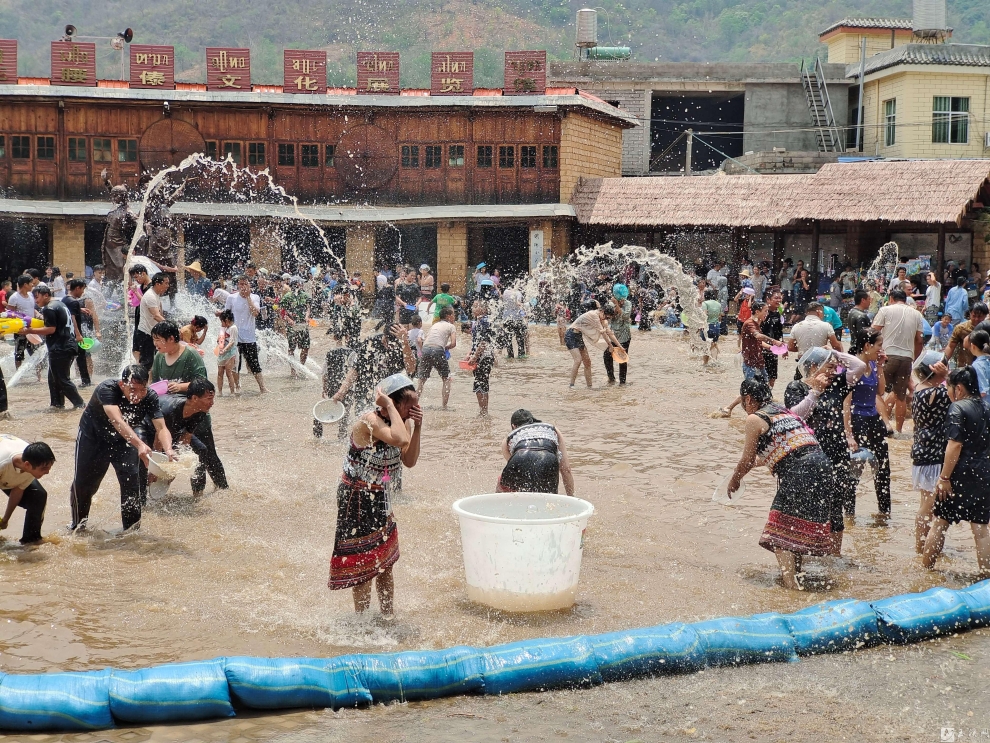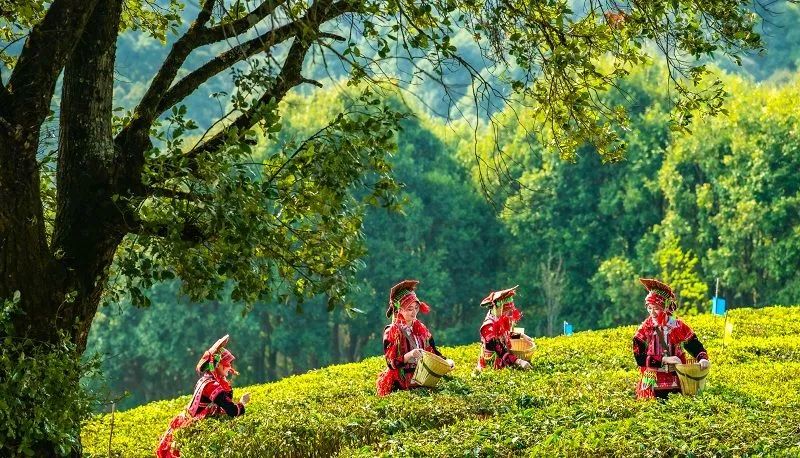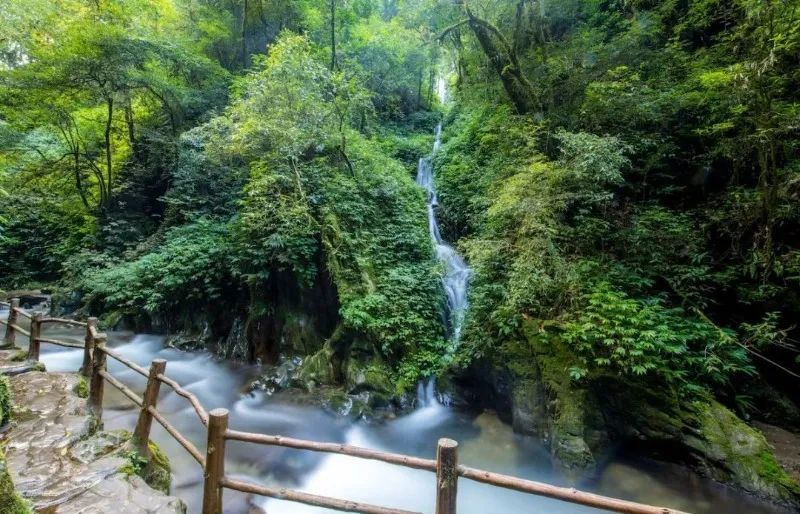 Yuxi Municipal People's Government
Yuxi Municipal People's Government

On April 29th, the annual Huayao Dai Ethnic Bathing Festival was held as scheduled in Mosha Town, Xinping County. Visitors from all over and local Dai ethnic people came together to engage in a joyous water-splashing celebration, bringing a refreshing breeze to the scorching summer day. The host announced the official start of the water-splashing ceremony, and eager tourists, holding various water-splashing tools, couldn't wait to jump into the water pool. They laughed and screamed while splashing water at each other. The saying "Water splashes, Dai family prospers," and "Getting wet brings lifelong happiness!" echoed through the crowds.
2023-05-01
Mr. And Mrs. Xue Hongsen, who worked in the northwest, came to Yuxi for a stay that lasted 18 years. Mr. And Mrs. Xue Hongsen live in the north of Yuxi Hongta District. Their house is clean and tidy, especially the small yard of 30 square meters, which is full of flowers and plants, decorating a lively and beautiful world. When asked why they moved to Yuxi, Xue Hongsen told us the story.
2023-04-08
Yuncha Manor is located within the Jinping Mountain Provincial Scenic Area in Eshan County, covering a total area of 2,256 acres. With winding rivers, picturesque mountains, abundant rainfall throughout the year, lingering mist, and fertile soil, it possesses the optimal conditions for the growth of organic tea. Just a 2-hour drive from Kunming, it is the closest and largest ecological tea plantation to the city. Yuncha Manor is a major producer of tea, serving as an important export base for red and green tea in Yunnan Province. The tea leaves grown here are plump and tender, with a glossy appearance, a bright yellow-green infusion, a rich and fragrant taste with a sweet aftertaste, and a unique floral aroma characteristic of the Ailao Mountains. Yuncha Manor is located within the Jinping Mountain Provincial Scenic Area in Eshan County, covering a total area of 2,256 acres. With winding rivers, picturesque mountains, abundant rainfall throughout the year, lingering mist, and fertile soil, it possesses the optimal conditions for the growth of organic tea. Just a 2-hour drive from Kunming, it is the closest and largest ecological tea plantation to the city. Yuncha Manor is a major producer of tea, serving as an important export base for red and green tea in Yunnan Province. The tea leaves grown here are plump and tender, with a glossy appearance, a bright yellow-green infusion, a rich and fragrant taste with a sweet aftertaste, and a unique floral aroma characteristic of the Ailao Mountains.
2023-03-17
Ailao Mountain is the largest mountain range in the western region of the Yunnan-Guizhou Plateau. The plants here, with the world's rare mid-mountain wet evergreen broad-leaved primitive forest as the main forest type, are also praised by botanists as a bright "emerald" in the crown of Yunnan plant kingdom, and a rare giant "green reservoir" in the world today. Scenic spots include Nanen River Waterfall, Longxi Clan Manor, Shimen Gorge, Tea Horse Road and other scenic spots.
2023-01-10Yunnan, a fascinating place, delights visitors with its beautiful natural sceneries and amazing ethnic cultures. The culture of ancient Dian Kingdom is especially attractive and for generations people have been trying to discover its historic traces. Relics unearthed from this period are splendid and they open a window for people to learn about the culture of ancient Dian Kingdom and also expose the mysterious Dian Kingdom from Southwest China to the world.
2019-02-27Lijiashan grave site lies behind Zaojie Village in Jiangcheng Township, right beside Chengjiang-Jiangchuan Road, 86 kilometers from Kunming and 44 kilometers from Yuxi. It is one of the major aristocratic grave sites of ancient Dian Kingdom. The excavation at the site in 1992 was listed as one of the Ten Most Important Archaeological Discoveries of the Year. The Dian Kingdom existed from the Warring States Period to early Han Dynasty. According to Historical Records, Emperor Wu of the Han Dynasty conquered the Dian Kingdom in the second year of Yuanfeng Period and Dian became a subordinate kingdom of the Han Empire. In 1966, some villagers started to cultivate land in the mountains, which destroyed some graves at surface that had lain there for over two thousand years. In 1972, the cultural relics team of Yunnan Province conducted the first excavation. In 1989, the grave site was listed on the first cultural relics preservation units of the county. From 1991 to 1992, the second excavation was carried out. In 1993, the site was approved to be one of the fourth cultural relics units of the province. In 2001, it was on the list of the fifth national key cultural relics preservation units announced by the State Council.
2019-02-27The Jinlianshan Mountains is to the east side of Jiucheng Village, Yousuo Township, Chengjiang County. This small and isolated mountains is about three kilometers from county downtown. It is at an elevation of 1,806 meters. The vertical height from the bottom to the top of the mountains is about 56 meters. In the Ming and Qing dynasties, the old town was the host to local government. In 1571, the government was moved to the new town. In history, the mountains used to be a famous scene that was called “golden lotus holding the sun”, because when the sun was setting, red light shone all over the mountains and the wild lotus grown on the mountains seemed to hold the sun.
2019-02-27The Hani in Yuanjiang is one of the oldest ethnic groups in China and they originate from the Di and Qiang peoples in ancient times. They were called Sou in the Qin and Han dynasties, Wuman in the Wei and Jin dynasties, Heman in the Tang and Song dynasties, Wo’man in the Yuan Dynastry, Woni in the Ming Dynastry, and Wonizu in the Qing Dynastry. The Hani in Yuanjiang totals 76,664 people, taking up 40.4% of the total population of the county. They mainly live in mountainous areas in Nanuo, Yangjie, Yinyuan, Mili, and Yangchajie townships that are located between 1,000 and 2,000 meters in elevation of Ailao Mountains. Their ancestors had been living in this area several thousand years ago. It is said that their ancestors used to be nomads in North China and then gradually moved southward until they reached Yunnan. Another account says that they lived a nomadic life in the Qingzang Plateau and moved southward and reached Dadu River and Jinsha River areas between the 3rd and the 6th centuries. In the Wei and Jin periods, they were divided into two branches to move further south. One branch reached Xinping, Yuanjiang, Jianshui, Shiping, Mengzi, Honghe, Yuanyang, Pu’er, Jiangcheng, and Xishuangbanna. The Hani in Yuanjiang originally has no written language and their spoken language is a sub-branch of the Yi language of the Tibetan-Burmese system of the Sino-Tibetan family. The Hani in Yuanjiang mainly live in mountainous areas where the climate is favorable with sufficient rainfalls and fertile soils suitable for farming. The terrace farming landscape created by the Hani is a world wonder. The major holidays of the Hani include the Hani New Year, the Yellow Rice Festival, the Kuzhazha Festival, and the New Rice Festival. During their holidays, all households kill pigs and chickens and making cakes out of sticky rice, preparing delicious banquets. All members wear colorful festive costumes to visit relatives and friends. Market fairs are also organized during the celebrations.
2019-02-27The Yi people living in E’shan are passionate and hospitable. They are good at singing and dancing and they love the nature. Their culture is splendid. Their costumes are predominated by black, white, red, and blue and the major fabrics are seen in black, indigo and blue. Their costumes are all handmade. Bright colors such as ink, yellow and green are seen in patterns and diagrams of flowers and birds. The Yi people are very hospitable and all visitors are welcome in the village. Hostess of the house will cook delicious meals to treat visitors. They like to eat big pieces of meat and drink with big bowls and sing toast songs to show hospitality to guests. Their houses are special in that the houses are usually built with clay which are cool in summer and warm in winter with sufficient light. Their houses are usually built in two floors with the upper floor for drying and storing grains and the lower floor for living. They are industrious and skillful in farming and therefore they obtain harvest almost every year. Their houses are usually built beside mountains and rivers and houses are close to one another. The important holidays of the Yi include the Torch Festival and the Dragon Worship Festival. During the Torch Festival, people go to the Daxi Mountains for the Flower Street Market. The purpose is not to visit the market but for commemorating a couple of lovers and expressing their wish for a better life. The Dragon Worship Festival is also an important holiday to the Yi. The worship is actually performed to trees. Trees can absorb the water underground which then evaporates into the air, enhancing the circulation of water, which is beneficial to farming. The Yi shows much respect to trees and big ones are chosen as subject for worship and they are called the Dragon Tree.
2019-02-27